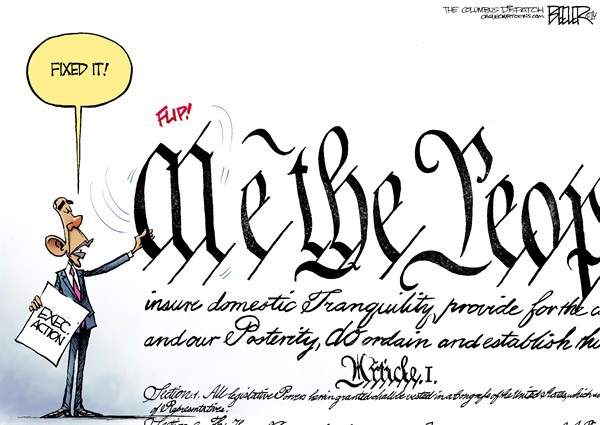
( Nat collaborated with his son, Nick Hentoff, on this week's column.)
"We the people of the United States, in order to form a more perfect union, establish justice, insure domestic tranquility, provide for the common defense, promote the general welfare, and secure the blessings of liberty to ourselves and our posterity, do ordain and establish this Constitution for the United States of America." -- Preamble, U.S. Constitution
When speaking about the war on terror, President Obama frequently invokes a biblical sense of justice that flows from the execution of a judgment through brute force rather than the rule of law.
"Those who make the mistake of harming Americans will learn that we will not forget and that our reach is long and that justice will be served," Obama said in 2014 after ISIS murdered American Steven Sotloff.
It is the sense of justice described in "The Battle Hymn of the Republic" as a "righteous sentence" meted out with a "terrible swift sword." Which may be acceptable rhetoric when used to rally public support in wartime, but is dangerous to democracy when used to govern a civil society.
The American ethos of justice embodied in the Preamble to the U.S. Constitution can be found in the Oxford English Dictionary (OED) definitions of justice, such as "the quality of being fair and reasonable," or "a concern for justice, peace, and genuine respect for people."
The Constitution lists the establishment of justice as the primary goal of America's founding document. All of the desired outcomes flowing from "a more perfect union" -- domestic tranquility, the common defense, the general welfare and the blessings of liberty -- depend for their success on the Constitution's promise to "establish justice."
As Obama's second term comes to a close, he leaves office with a record that will be defined by the abandonment of the principles of due process and the rule of law that are the foundation of the American ethos of justice.
The Guantanamo Bay prison, a due-process-free black hole of injustice, is still open and damaging America's reputation and credibility abroad. In 2011, Obama expanded Guantanamo-like indefinite detention by signing the National Defense Authorization Act (NDAA) for Fiscal Year 2012, which authorized the indefinite detention of U.S. citizens.
Jonathan Turley, writing in 2012 for The Guardian, called Obama's position on indefinite detention of U.S. citizens a "historic assault on American liberty." The American Civil Liberties Union said that Obama "will forever be known as the president who signed indefinite detention without charge or trial into law."
Fifteen years after the Patriot Act was first passed, and nearly eight years after Obama became president, the indefinite detention of Americans is still authorized under U.S. law.
Congress deserves blame for the failure to close Guantanamo and to end authorization for the indefinite detention of Americans. But Obama's culpability cannot be ignored in apportioning blame.
He bears all of the blame for the civil liberties outrages that were entirely within his control and which enjoyed his vigorous support. These include adopting regulations and procedures that broadly authorize the remote extrajudicial killings by drones not only of foreign combatants, but also innocent civilians and even American citizens living abroad. Obama also sanctioned the CIA's illegal torture program after the fact by refusing to prosecute those responsible for blatant violations of U.S. and international law.
Such a ubiquitous disregard for the rule of law threatens to cripple our ability to protect and preserve our civil liberties. The lasting legacy of Obama's war on terror may just be the institutionalized abandonment of the American ethos of justice. And that is a tragedy of historic proportions.
Comment by clicking here.
Nat Hentoff is a nationally renowned authority on the First Amendment and the Bill of Rights and author of several books, including his current work, "The War on the Bill of Rights and the Gathering Resistance".



 Contact The Editor
Contact The Editor
 Articles By This Author
Articles By This Author